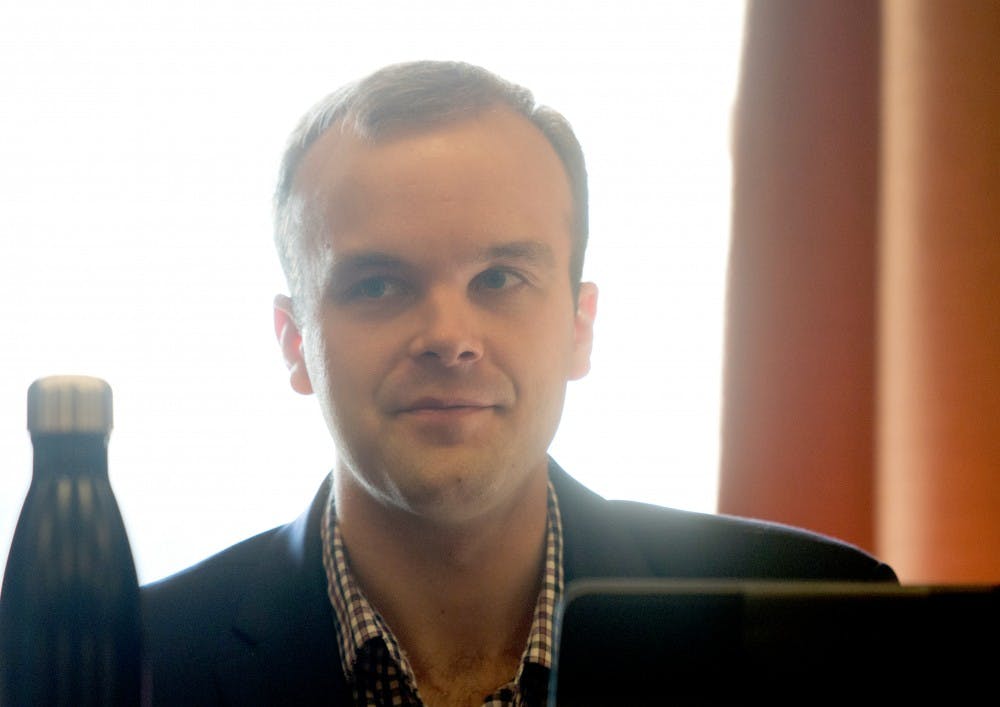The University Judiciary Committee met Sunday night to introduce the committee’s new executive board and hear a presentation from the Judicial Review Board on the UJC’s responsibility to ensure fairness in student disciplinary proceedings.
Before introducing the guest speaker, Peter Bautz, a Law student and UJC chair, welcomed the Committee and officially announced the new executive board members who were elected last Sunday in a closed session. The new executive committee consists of third-year Engineering student Kevin Warshaw as chair and third-year College student and rising Commerce graduate student Megan Routbort, second-year College student Sam Powers, third-year College student Jordan Arnold and Batten graduate student Stephanie Ibanez as vice chairs.
Following announcements, Bautz welcomed Jill Rockwell, a senior assistant dean for Student and Career Services at the University’s Frank Batten School of Leadership and Public Policy, who serves as chair of the JRB.
The JRB — which is comprised of students, faculty, staff and administrators — is the external body charged with hearing appeal decisions in UJC cases as well as decisions of the UJC referred for review by the University’s vice president and chief student affairs officer.
Rockwell gave the presentation to inform students of the importance of correcting student violations by assigning rehabilitative and educational sanctions on students who commit repeat violations before taking further administrative action.
“How a student handles him or herself when faced with a charge before the UJC could have implications that really extend long after their time at U.Va.,” Rockwell said. “To me, UJC proceedings reflect the ultimate demonstration of student self-governance and also empathy at a time when students are facing one of the toughest challenges of their lives. The focus on rehabilitation is something that is really important.”
As the central governing and operating body of the University Judicial System, the UJC is responsible for investigating alleged violations of the University’s Standards of Conduct and is comprised of 25 representatives who are elected from the 12 undergraduate and graduate schools at the University. According to Rockwell, the UJC also works with accused students and gives them the opportunity to take responsibility for their actions and learn from their mistakes.
Rockwell noted the importance of “rehabilitation” in the UJC. She referenced her past experiences at Duke Law School, where the school did not have a single sanction of expulsion system and instead emphasized assigning rehabilitative sanctions. Currently, the UJC can impose any sanction ranging from oral admonition to expulsion, but does not follow a single sanction system like the Honor Committee.
“I love the UJC because it does give you the chance to work with students and help them understand and figure out that it’s better to make a mistake in college than when you get fired and you have a mortgage and a family depending on you,” Rockwell said.
The JRB usually affirms decisions made by the UJC, but it is responsible for taking appeals from the committee. Rockwell said the three grounds for appeal are a procedural error during a trial, newly discovered evidence not available at the time of the trial and unduly harsh sanctions.
Rockwell also spoke about the types of punishments and sanctions the University could apply to students who violate the Standards of Conduct. She said the University can remove students from extracurricular activities such as sports or suspend them from aspects of campus life such as study abroad. Public universities can also punish students by asking them to attend courses or workshops designed to help them avoid future misconduct, such as alcohol, substance abuse or anger management programs. However, Rockwell said public universities cannot force a student to adopt an organization's officially sanctioned views on controversial topics to which they may object — such as race, sex or sexual orientation — even if the offense relates to the views on these topics.
“[The JRB is] looking for sanctions that are rehabilitative in nature, sanctions that take a strong stance with repeat offenders,” Rockwell said. JRB also takes into consideration what steps the appellant has taken following their violation.
Rockwell ended her presentation by offering some suggestions for the UJC to consider, such as expanding the educational goals of the committee to include more of an emphasis on rehabilitation and genuine contrition, and to offer students the ability to have a positive reentry into the University community. She also suggested the UJC collaborate with orientation and back-to-school alcohol training programming, as well as revisit the procedural grounds for appeal and offer alternative rehabilitative options for students who independently engage in rehabilitation before appealing.
“The thing that I hope they got out of it is a full appreciation of the responsibilities they have, but also sort of a full appreciation for the good [they do],” Rockwell said after the meeting. “Acknowledging that many people make mistakes in their lives, understanding the role that they can have to help people come out feeling better, like really learning something in the process, taking the good or something positive out of the situation, the opportunity to help them conform their behavior and actually have a much more positive contribution on the back end.”
UJC’s next general body meeting will be held April 8 at 6 p.m. The executive board members will formally announce the appointed senior support officers at the meeting and will make an official transition to new leadership. UJC will also be handing out committee awards.
According to Bautz, senior support officers for the next term are still being selected, and decisions will be released to individual candidates on Monday or Tuesday once representatives give their approval.







